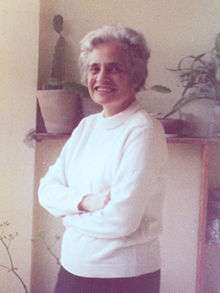Rose Peltesohn
Rose Pauline Peltesohn (16 May 1913 in Berlin – 21 March 1998 in Kfar Saba, Israel) was an Israeli mathematician of German origin.
Rose Pauline Peltesohn | |
|---|---|
 | |
| Born | May 16, 1913 |
| Died | March 21, 1998 (aged 84) |
| Alma mater | Humboldt University |
| Spouse(s) | Gerhard Peltesohn |
| Children | Ruth (born 1940), Judith (born 1943). |
| Scientific career | |
| Fields | Combinatorics |
| Institutions | Berlin, Tel Aviv |
| Thesis | Das Turnierproblem für Spiele zu je dreien (1936) |
| Doctoral advisor | Issai Schur |
Life
Rose Peltesohn was the daughter of the physician Ludwig Peltesohn (1882–1937) and of Cilly Caro.[1] After graduation (Abitur) in March 1931 she studied mathematics and physics at the University of Berlin and got her Ph.D. in Mathematics at 1936 with Issai Schur [2] as supervisor (Das Turnierproblem für Spiele zu je dreien, The tournament problem for three person games). Her dissertation was valued opus valde laudabile(de). Being Jewish she emigrated through Italy to Palestine, arriving 1938.[3] Between the years 1939–1942 she worked in a bank and later as a lawyer's secretary and translator in Tel Aviv. She married her cousin Gerhard Peltesohn, a lawyer (1909–1965), and they had two daughters, Ruth (born 1940) and Judith (born 1943).
Solution of Heffter's Difference Problems
Peltesohn solved the Difference Problems of Lothar Heffter (1896) in combinatorics in 1939.[4] A Difference Triple (a, b, c) is defined as three different elements from the set , whose sum equals zero () or for which one element equals the sum of the other two ().
- First Difference Problem of Heffter: Let . Is there a partition of the set in difference triples?
- Second Difference Problem of Heffter: Let . Is there a partition of the set in difference triples ?
Following Peltesohn, such a partition exists with the exception of the case v = 9.
An example of the partition for is: (with ) and (with ).
The solution of the Difference Problem of Heffter also gives a construction of cyclic Steiner triple systems.
Literature
- Maximilian Pinl (1969). "Kollegen in einer dunklen Zeit". Jahresbericht Deutsche Mathematikervereinigung (DMV). 71: 171–228. in particular pages 188–189
External links
References
- Peltesohn (1936), p.20; in contrast, Renate Tobies' short biography uses "Zili"
- Rose Peltesohn, Das Turnierproblem für Spiele zu je dreien, 1936, p. 2, 20
- Reinhard Siegmund-Schultze (6 July 2009). Mathematicians Fleeing from Nazi Germany: Individual Fates and Global Impact. Princeton University Press. pp. 19, 128, 353. ISBN 978-1-4008-3140-1. Retrieved 31 October 2018.
- Rose Peltesohn (1939). "Eine Lösung der beiden Heffterschen Differenzenprobleme" (PDF). Compositio Mathematica. 6: 251–257.